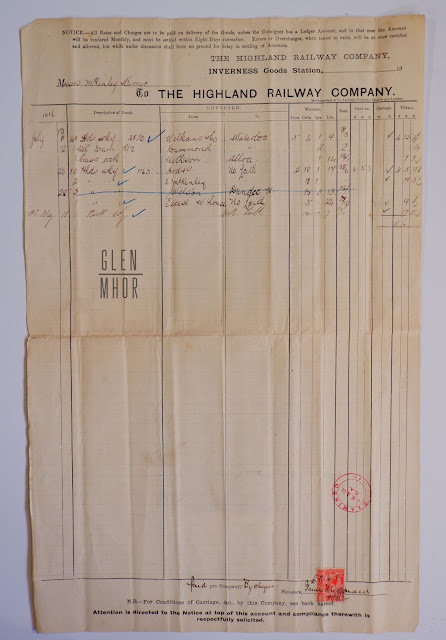July 1916 The Highland Railway Company
July 1916 represents a brief and ultimately tranquil period at the distillery, as traditionally Glen Mhor was closed for its silent season during June and July. The above invoice is likely indicative of this, as the men were engaged in a variety of maintenance tasks that needed to be completed while distilling was temporarily suspended.
This invoice is the most recent in a series of Highland Railway documents that we have been fortunate to acquire as part of the Go Fund Me initiative last year, which was a resounding success. I would like to express my gratitude once again to the individuals who made this a reality. My contribution to this endeavour was to make these documents available to a wider audience while discussing their significance. Additionally, a series of 1917 train invoices is accessible via the hashtag "Highland Railway Company" for those with an interest in railways and freight.
On this invoice we have the appearance of Wilkans & Co. with an order of 20 hogsheads of whisky, also with Waterloo being mentioned. Regulars with a long memory will recall we've seen this location previously and rather than the more famous Waterloo station in England, it is likely to refer to the same station but in the Aberdeen area, as there was a Waterloo on the Highland line.
The remainder of the invoice details the sporadic shipment of casks, with the majority destined for Leith. Of note is the inclusion of a single butt that has been backdated to May 1916. Of particular interest is the single cask that is being dispatched to the Excise warehouse in Leith. This could be indicative of a private vendor or an international dispatch.
The reverse of the invoice displays the consistent filing summary that has become characteristic of the Glen Mhor distillery office system.
The full entries of goods movements, reads as follows:
'10th July
20 hogsheads whisky (Wilkans & Co.) to Waterloo
12th July
1 ?? drum, return? (Drummond) to Waterloo
1 brass cook? (Willison) Alloa
20th July
10 hogsheads (???) Leith
2 hogsheads (McKinley) Leith
28th July
3 hogsheads (J Watson) Dundee - this entry scored out
1 hogshead (Excise house) Leith
Additional entry:
2nd May
1 butt (not listed) Leith'
It seems probable that we are observing a repetition of the McKinley typo that was previously identified in the June 1916 invoice. The drum entry, which is likely to be Waterloo on the Highland line, rather than London, is not entirely clear. Additionally, there is an entry relating to brass, which will be seen again in the August invoice. This may be connected to the silent season and the men undertaking minor repairs or maintenance on site.
As always, I'm thankful for the input of Alan Winchester, who was able to offer more detail on some of these entries and their purpose:
'Interesting, Willison in Aloa is now Abercrombie owned by Diageo, in Rothes they're now Forsyth, Mr Willison, disposed of the company to the foreman in charge at each site, Rothes one was A. Forsyth.
I do not know what brass could be if it was copper links that would have been for the rummager in the wash still.'
Alan's thoughts on the brass are logical, as he previously noted what was likely to be a rummager in the James Eadie publication, The Distilleries of GB and Ireland, which was highlighted in our revisit to the still room article. The presence of this brass could potentially indicate that a rummager was in use at the distillery. Given that the publication images date from the early 1920s, the time frame fits.
Overall, this invoice, issued during the period of relative inactivity that represents the silent season, conveys the impression that the focus of the company's activities is not on fulfilling orders. The odd cask comes out of the warehouse occasionally, but in general, this is a period of rest, recharging, planning and repair work at the distillery.


Comments
Post a Comment